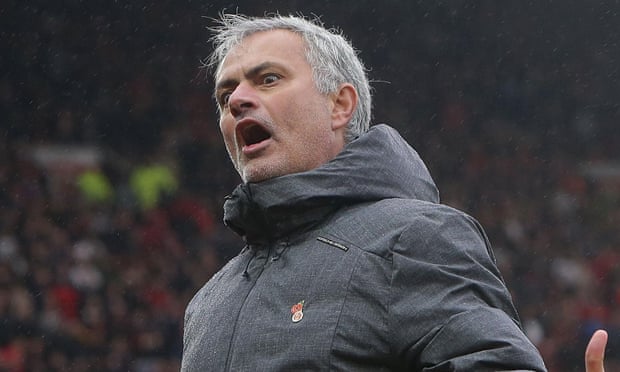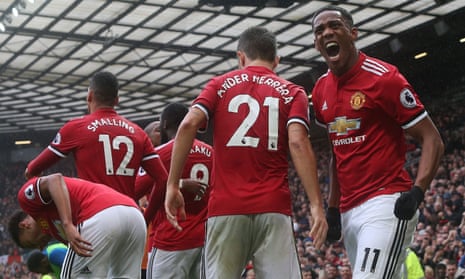‘Sometimes, it was as though he could see the future,” the former goalkeeper Vítor Baía said of José Mourinho, who coached him at Porto. “I remember a specific incident against Benfica, when throughout the week he prepared us for what we should do after we scored a goal … He told us that [the Benfica coach José Antonio] Camacho would make a specific substitution and change his tactics, which was what happened. So we already knew what to do when he did it; we were completely prepared for it. For the same match, we also prepared to play with 10 players because José knew the referee would not be able to take the pressure and would show a red card along the way. That also happened … so we knew what to do and got a narrow win.”
Perhaps the win against Tottenham Hotspur on Saturday did not demonstrate quite such prescience but it did go precisely to the Mourinho gameplan. It is no coincidence that Manchester United keep scoring late goals: that’s 11 after the 80-minute mark already in the league this season. Nor is it any coincidence that Anthony Martial has come off the bench four times to score this season. Mourinho spoke warmly afterwards of the 21-year-old’s ability to run with the ball; he is, in other words, the ideal player to come on late in the game to run at and behind opponents who may be beginning to suffer fatigue and are thus more prone to the mistakes such as that made by Jan Vertonghen in failing to read Romelu Lukaku’s flick-on. “Annoying,” Ben Davies called it; rather stronger words you can imagine being used in the visitors’ dressing room.
Yet, for all that was positive about United’s display, for all that they improved after half-time to have half a dozen decent opportunities, there remains a slight doubt. In Diego Torres’s biography of Mourinho, he details the manager’s seven-point plan for winning big games:
1 The game is won by the team who commits fewer errors.
2 Football favours whoever provokes more errors in the opposition.
3 Away from home, instead of trying to be superior to the opposition, it’s better to encourage their mistakes.
4 Whoever has the ball is more likely to make a mistake.
5 Whoever renounces possession reduces the possibility of making a mistake.
6 Whoever has the ball has fear.
7 Whoever does not have it is thereby stronger.
Quick GuideJosé's home truths
Show

Chelsea (Nov 2014)
'At this moment it’s difficult to play at home because playing here is like playing in an empty stadium'
Manchester United (Jan 2017)
'The fans – they also have to do better … So my invitation is don’t come to the theatre, come to play, play with us'
Manchester United (April 2017)
'Did the supporters know it [how much the players were struggling]? Because if they know it, and they think about it, they would be more supportive of the players'
Manchester United (Aug 2017)
'They were very quiet. It was easy to know that was a goal because it was the first time I really understood the stadium was full'
This was not quite a classic of that genre – it was not Mourinho’s Chelsea at Anfield in the game of Steven Gerrard’s slip – and they had 44% possession, but it did rely on Spurs making a mistake, on them being undone by the simplest of long balls.
Because Spurs did make that mistake, the plan can be seen as a success but if Eric Dier had won the header against Lukaku or if Vertonghen had been sharper to react, or if Martial had not scuffed his shot in such a way that the bounce confounded Hugo Lloris, if it had finished 0-0 – or worse, if Dele Alli had converted the one real chance Tottenham created – Mourinho would once again be being criticised for his negativity.
Baía, no doubt, would argue that Mourinho’s reading of the game, his capacity to predict what will happen, is so good that a mistake was likely. Perhaps, given Spurs’ terrible record in away games against top-six sides under Mauricio Pochettino – only one win in 16 now – it was predictable, a case of the psychology of the game influencing the tactics. However, there will be times, as with United at Anfield two weeks ago, when the game doesn’t break, when the opposition doesn’t make the mistake and the result is stalemate.
Against an in-form Tottenham side, perhaps that’s a reasonable risk to take; more reasonable, certainly, than it seemed against a faltering Liverpool – but the point is that it is a risk. Mourinho likes to talk about pragmatism, portraying himself as a realist against the “poets” who talk a good game but don’t win titles, but his approach seems no less risky than, say, the flamboyant attacking game of Pep Guardiola’s Manchester City. The difference, rather, is in the nature of the risk. City’s openness risks conceding; United’s closedness risks not scoring if the mistake doesn’t come.
This time, though, it did. The plan worked, United retain a 100% home league record without having conceded a goal, and Mourinho retains his reputation as a fortune-teller. The danger with any game of chicken, though, is that sometimes the opponent doesn’t blink.

Comments (…)
Sign in or create your Guardian account to join the discussion